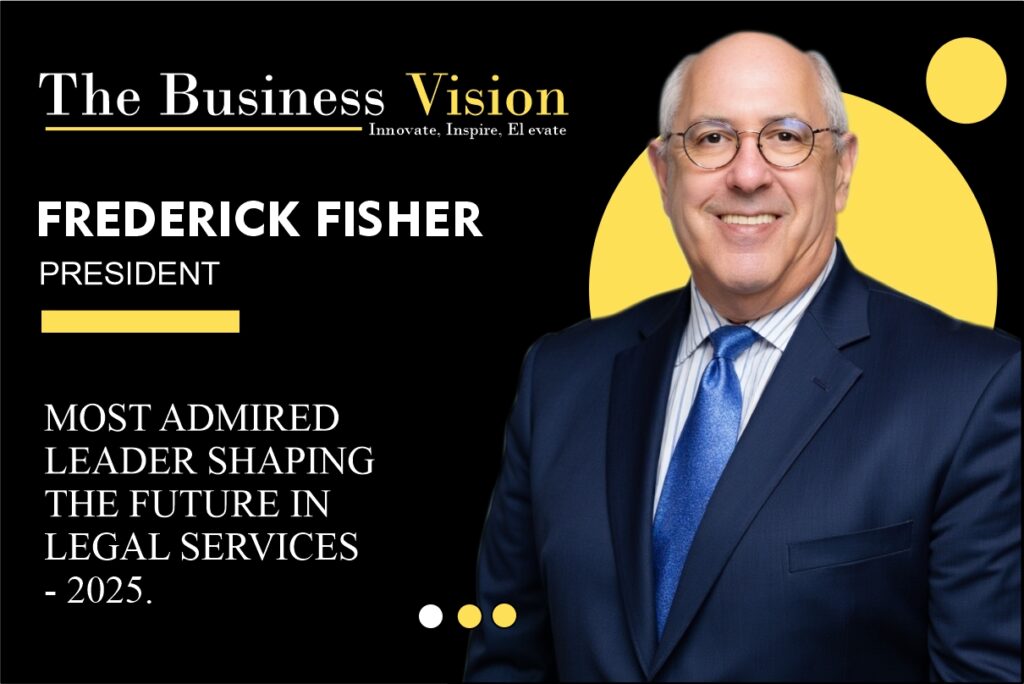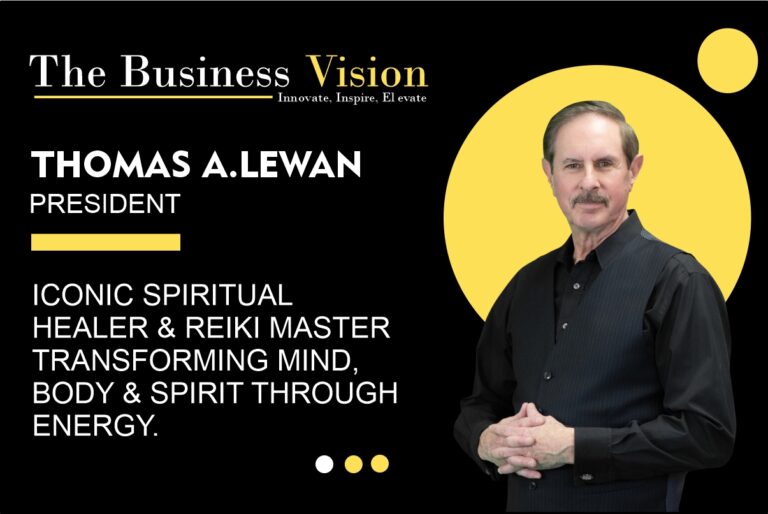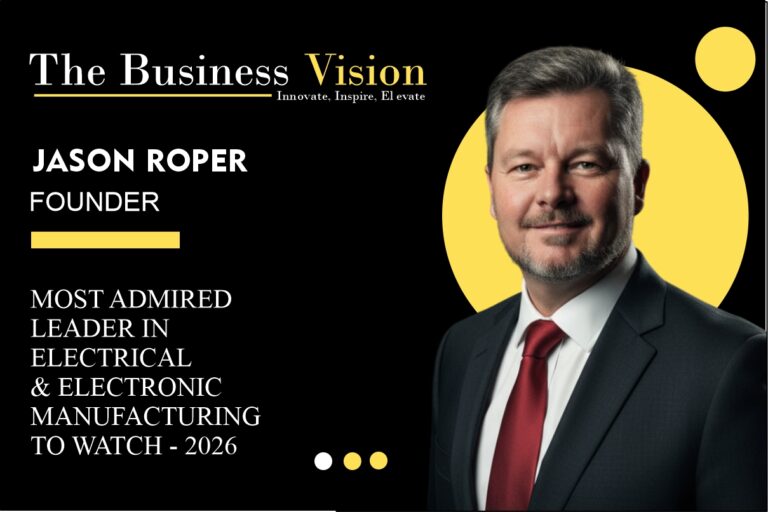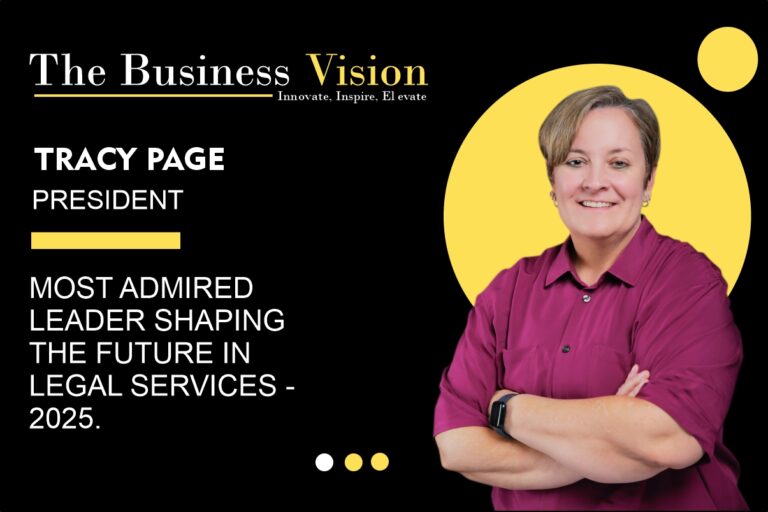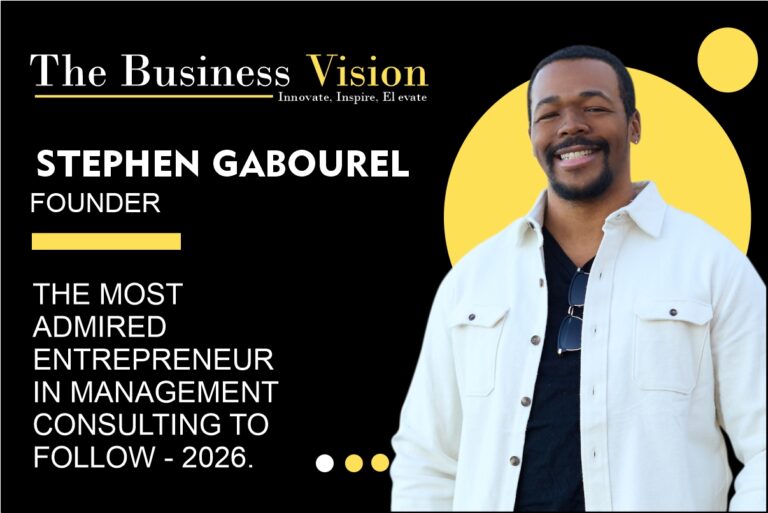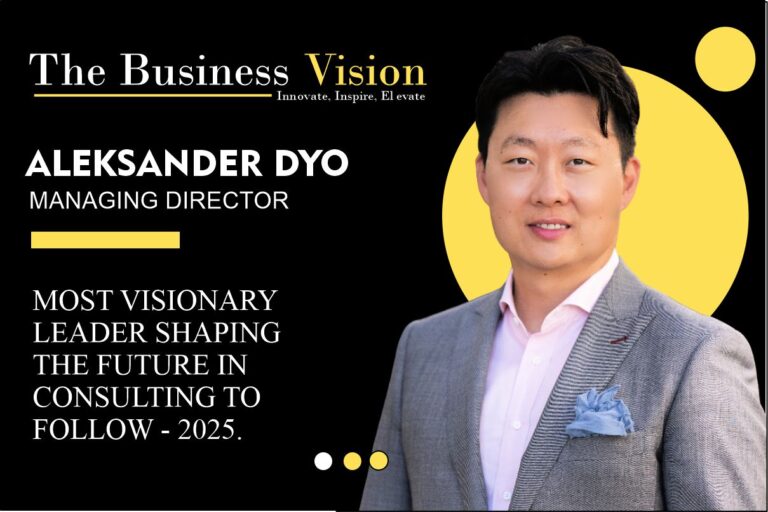Although professional liability is a highly complex and often litigious field where million-dollar claims hinge on intricate policy wording and expert testimony, Frederick Fisher is a brilliant shining beacon of clarity and principle. Fisher’s journey from a socially conscious, insurance-selling graduate and a fearful beginner in the legal services field to an industry expert witness and educator is testimony to a career built on the pursuit of knowledge and integrity, rather than profit. Fisher, who is the president and founder of Fisher Consulting Group, Inc., has built a reputation for clarifying professional liability and has built a career advocating for ethical practices where the industry has refused to. Illustrating success and professional achievements, the legendary Fisher also shows the world the power of integrity, transparency, and relentless pursuit of knowledge to transform, for the better, a professional and legal industry. Fisher is also a “Most Admired Leader Shaping the Future in Legal Services—2025.”
An Unconventional Entry into Insurance
Frederick Fisher’s rise to the top of professional liability consulting is an ironic tale of twisty fates. It started not with a passion for insurance but with a visceral aversion to it. Fresh from college with a degree in social science, he saw the idea of peddling insurance policies as a disheartening, yet probable, life path—a traditional choice for which he had little passion.
This very fear, however, was the first impetus that pushed him toward his path. With a keen, analytical mind and innate debating ability, he wanted a more exciting future and viewed law school as the logical exit route, an upscale pathway on which his talents could be unleashed. His early dreams were tinctured with the romance of the creative life; he envisioned himself acting as counsel to artists and musicians, charting the dynamic crossroads where law and culture meet.
It was a far cry from the precise, sometimes staid world of insurance provisions and liability suits that would come to characterize his legacy. It was this roundabout path—driven by the wish to escape one destiny, only to become its master—that placed him singularly to deliver a new, critical, and profoundly human approach to a discipline too often veiled in obscurity, laying the ground for a career that would be anything but ordinary.
Foundational Training in Law and Litigation
What turned Frederick Fisher from a law graduate into an industry leader was his experience as a law clerk to the house counsel for Liberty Mutual Insurance Company. Working there was an intensive, real-world, crucible experience that no amount of classroom education could replace. He transitioned from abstract legal theory to understanding the complex, concrete mechanics of the insurance industry. He witnessed, live, the full cycle of a claim: policy interpretation, coverage analysis, litigation strategy, and courtroom defense.
This experience revealed the relationship between insurance law, corporate risk, and the legal framework and provided a solid foundation for the understanding that would become the bedrock of his expertise. The knowledge and experience that shaped his judgment in that position was his first and most important asset and the basis of his career, forming the prism through which he would view professional liability, now his specialty.
The Entrepreneurial Leap into Expert Witness Work
The entrepreneurial spirit that defined Frederick Fisher’s career didn’t end with the success of his first ventures; instead, it smoothly transitioned into his most pivotal role. After setting up and running two successful companies—one in professional liability claim adjusting and the other in wholesale insurance brokerage—he had already established himself within the industry. Yet, it was his simultaneous dedication to thought leadership that truly amplified his standing and reputation, as he authored articles and led training seminars within the industry. This served to position him not merely as a prosperous entrepreneur but as a preeminent intellectual authority within the profession itself. This reputation led to many attorneys struggling with professional liability issues seeking him out, as he was one of the few 40-plus-year-experienced professionals who could articulate complex scenarios and serve as an expert witness. What he had planned as a semi-retirement—a less stressful role of wisdom and testimony in court—became, quite unexpectedly, one of the most rewarding chapters of his life.
A Leadership Philosophy Centered on Empowerment
Frederick Fisher’s leadership philosophy, developed in his previous companies, was specifically based on empowerment through purpose. He recognized that motivated and aligned people were the true source of sustainable success, and he created that motivation through clarity of the corporate philosophy he shared. His slogan, “We provide financial security; we let our competitors sell some insurance,” was more than a clever and catchy slogan. It served as a strategic and ethical framework for his brokerage’s organization.
This powerful statement reframed how his employees perceived their role on a daily basis. They were no longer focused on the pressure to close a sale while transacting; now they understood that the key purpose of their work was to protect their clients and companies if something were to happen that would threaten their financial security. They clearly were empowered to understand that what the organization was asking of them was to be builders of resilience rather than simply sellers of a product. Frederick Fisher solidified this by building a culture where credit was given where it was due, excellence was applauded, and promotions were given based on assessing whether one was following through positively on these two concepts. By redirecting the corporate goal from revenue to responsibility, he empowered his team to make decisions with integrity, fostering a profound sense of pride and a shared commitment to delivering on the promise of true financial security.
Pioneering Claim Audits that Saved Millions
Frederick Fisher didn’t just process claims; he redefined how the industry viewed, managed, and processed claims through his breakthrough development of claim auditing and compliance practices. In doing so, Fisher went beyond straightforward quantitative evaluations and developed a number of rigorous qualitative processes, examining everything from a claim’s philosophy to the claim’s effectiveness within a claim-handling process.
To Fisher, audits were the starting point because they were diagnostic tools designed to identify systemic areas of weakness, inefficiencies in procedures, and judgment gaps that led to avoidable financial leakage in the notice of losses. For his clients, which included significant corporations, major insurers, and prominent public entities, audits were eye-opening, providing clear, actionable steps to make improvements that had real implications for the bottom line, including reducing claims and legal expenses stemming from unresolved or duplicate claims, as well as preventing future mistakes, generating millions in savings.
Additionally, many of the audits produced for public organizations went into the public sphere, where the results, methodologies, and techniques initiated widespread respect and interest in the findings across the industry and across various other lines of coverage. This transparency meant that the sector could not help but reflect on not only how subsets of its own operations, insurance programs, and self-insured programs were performing, but more in terms of the effectiveness of self-assessment in improving overall financial and operational performance. In this way, Frederick Fisher’s innovative audits did not just save money for his clients; they elevated the standards for claims-handling excellence across the entire professional liability landscape.
Authoring a Landmark Industry Classic
Frederick Fisher has contributed to the professional liability industry through his book, “Claims-Made Insurance—The Policy That Changed The Industry.” It has been recognized as “an irreplaceable classic” by The Insurance Journal and The Academy of Insurance, tracing the history of claims-made policies from their origin to plasticity.
Fisher describes it as practical by providing a means for insurance professionals and underwriters to issue complex coverages and for policyholders to understand their rights and duties. It has received 17 five-star reviews on Amazon, one of the reviews by Kevin Quinley, CPCU, who describes it as “Frederick Fisher delivers an authoritative yet accessible guide to one of the most important types of insurance coverage. With clear explanations and practical tips, this book empowers readers to make informed decisions about liability insurance and avoid costly mistakes. A must-have for anyone seeking to understand and navigate the complexities of claims-made policies!”
Frederick Fisher tried to write and to educate by the principle of honesty, of which clarity and prevention are the pillars. He learned early that his straightforward insights and solutions won people over. He points out that, while insurance is a means of protection, a policyholder’s unwillingness to control their exposure to risk can facilitate losses to others. The policyholder and everyone else, including the unwitting victim, stand to suffer from the consequences.
Identifying the Critical Industry Gap: Education
Frederick Fisher recognizes a deep and corrosive gap at the core of the modern professional liability industry: the devaluation of education and training and the abandonment of any systematic mentorship, a need now being met by the Mentor program sponsored by the Professional Liability Underwriting Society. He notices with concern that there is little, if any, structured mentorship that would support new employees; instead, employees are simply thrown into the deep end with a “sink or swim” mentality, which does not benefit either the employee or the client. PLUS is now filling that void.
The absence of some foundational training leads to a workforce that might have knowledge of procedure but lacks the broad, contextualized judgment that is necessary to handle complicated claims (if only the claim has any potential for value). To complicate these factors further, he also points to a prevalent corporate culture involving short-sighted budget expenditures that seek to cut costs.
Carriers (and firms) know they need to maximize near-term profits, but they do not biopsy any budget that seeks to meaningfully develop the claim investigation, evaluation, and resolution, considering it a “cost” instead of a “real investment” in the development of a claim. To Frederick Fisher, this misdirection with money is very damaging. Organizations are always going to spend larger sums of money to properly train their employees to understand how to analyze and resolve claims at the right time, instead of letting cases deteriorate and eventually using outsized legal fees to fix the error of misallocated costs.
A Candid Warning on the Erosion of Coverage
Frederick Fisher gives a straightforward warning regarding a calculated and dangerous trend radically changing the professional liability landscape: the progressive loss of insurance coverage. He notes that insurance policies are being systematically emptied, a process driven by greed and the pursuit of profit. This is not happenstance, but instead insurance carriers are creating policies that cover “less and less” by introducing more exclusions, sub-limits, or more narrowly defining coverage and the usage of “staggeringly broad Absolute Exclusions.”
This strategic and purposeful regression creates greater risk for the very professionals and businesses they contracted coverage for, ultimately leaving them financially vulnerable. Fisher’s well-founded alarm is echoed at the highest levels of regulation. He notes that the National Association of Insurance Commissioners (NAIC) knows all too well that a dangerous trend is occurring and is particularly concerned with the increasing presence of private equity firms and hedge funds in the insurance market. The fear is that these actors are amplifying this race to the bottom for profit, plundering or undermining the underlying value proposition of insurance: financial security. This situation, Frederick Fisher argues, is an economic risk fueled by profit-inducing behaviors that undermine the purpose of the industry of insurance.
The “Educator in Chief” Simplifies Complexity.
Frederick Fisher, affectionately nicknamed “Educator in Chief” by IMPAAKT Magazine, has made it his personal crusade to demystify professional liability. His true genius is his ability not only to know the subject in great depth but also to be able to apply it in reducing the arcane language and terms of the insurance policy world into persuasive stories that resonate with sophisticated industry representatives and layperson juries.
He willfully disregards the sober and murky jargon that plagues the industry as a barrier to understanding and justice. Rather, his approach is grounded in developing real-life examples and relatable analogies that illustrate the basic principles. This skill distinguishes him from a technical expert to a unique communicator, while magnifying his credibility as an expert in the courtroom.
He does not testify with quotes from policy wording; he builds understanding about what a jury should expect based on possible breaches of coverage, claims, and industry expectations. He achieves clarity while he rejects complexity to ensure that the matter’s truth is not lost in translation; hence, he can add value as a witness but is a decisive witness on the stand.
A Principled Stance on Technology and AI
Although he readily concedes that technology has radically enhanced the speed and efficiency of service delivery in both the insurance and legal industries, Frederick Fisher provides one important and sobering counterpoint to the industry’s blind enthusiasm: “Artificial intelligence may make people stupid.” This provocative assertion rings true with his grounding fear that excessive reliance on automated systems will lead to a dangerous deterioration of critical thinking and expertise in human judgment. Fisher argues the basic computing principle of “garbage in, garbage out” cannot be changed;
AI systems are only as good as the data and algorithms upon which they build and lack the judgment that comes with experience. Frederick Fisher reminds us that powerful tools such as AI should be thought of as an advanced form of assistant and not as oracles that can provide answers without human verification. As such, our advanced assistants require planning, vigilance, and human oversight to evaluate their output of theories and conclusions and roughly assess the ethical implications of their bioethical appropriateness.
His worry is that, if we fall into the trap of ultimate reliance on AI, it will simply be used to further complicate policy language to algorithmically deny coverage, erasing the trust and security that should be the basis of the insurance relationship. Fisher is clear that if we are to fully benefit from utilizing this technology, humans must be in control of the AI process and not the other way around.
A Legacy Built on Honesty and Continuous Learning
The lasting legacy Frederick Fisher’s building stands on two firm foundations—radical honesty and a relentless commitment to continuous learning. His North Star, a promise he’s making to every client and colleague—”I’ll tell you what you need to know, not what you want to hear”—is much more than a motto; it’s the ethical engine behind his whole life’s work.
Fisher’s commitment to truthfulness and radical honesty has established him as a rare and trusted authority in a field where obfuscation is not uncommon, and it is this integrity that lends weight to his expert testimony and transformative value to his consultations. Honesty is unequivocally tied to his belief in lifelong learning; he appreciates that in a complex and evolving industry, to cease being a student is a professional death sentence.
His major counsel to the next generation is to never stop learning, and that will keep your mind and knowledge deep and, most importantly, pertinent to the industry. Importantly, he couples this with a key tenet: earning a worthwhile living is not the goal; it is a continued outcome of doing exceptional quality service and working with integrity. In Frederick Fisher’s worldview, the pursuit of excellence and honesty, not the pursuit of profit, is what ultimately builds a respected and enduring career.
Conclusion
Frederick Fisher has a clear vision for the future; however, he is also a realist. He sees the trend in the industry to prioritize profits over service as inherently dangerous and a serious attack on the viability of legal services and professional liability. And rather than rant, he responds with renewed determination in the face of challenges. At Fisher Consulting Group, the mission has not strayed either. He continues to be guided by the principles he has built his career standing upon and practicing for five decades: to educate, to clarify, and to advocate tirelessly for insurance policies that deliver true financial security. While the industry is facing the forces of the disruption of technology and the dilution of ethics, his authentic voice as an honest broker, master educator, and principled leader has never been more relevant. He is not simply a witness to the future of legal services but is working for it to be purposeful and principled.

